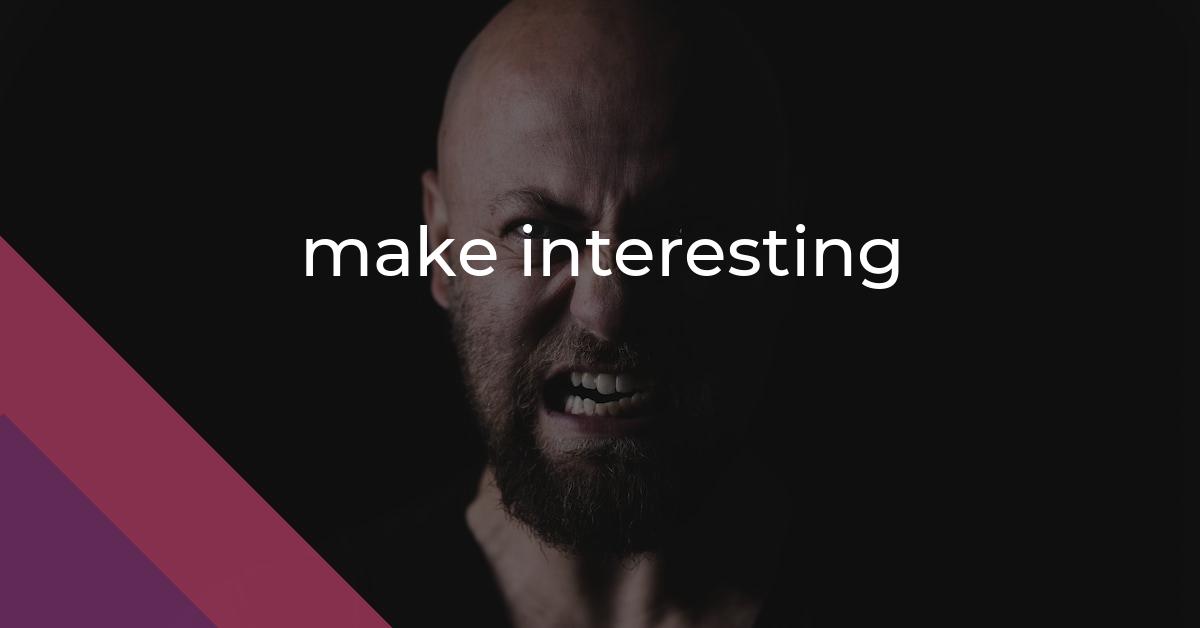make interesting: Idiom Meaning and Origin
What does ‘make interesting’ mean?
The idiom "make interesting" means to add excitement, intrigue, or appeal to something, making it more engaging or captivating.

Idiom Explorer
The idiom "turn heads" means to attract attention or make people notice and look at someone or something because of their exceptional appearance or behavior.
The idiom "put on frills" means to add unnecessary or excessive decorative details or embellishments to something, typically to make it more attractive or impressive.
An idiom that means to expand or increase the length or content of something, often by adding unnecessary or unimportant details.
The idiom "mix it up" means to vary or change something, often in order to avoid boredom or routine. It can refer to mixing up activities, ideas, or even people to bring about freshness and diversity.
The idiom "make waves" means to cause trouble or create a disturbance by doing something unconventional or challenging the status quo.
The idiom "make it" means to be successful or achieve a desired outcome. It can refer to reaching a destination, reaching a goal, or accomplishing something. The phrase is commonly used in situations where someone overcomes challenges or obstacles to achieve a positive result.
The idiom "make history" means to do something that will be remembered and have a significant impact on the future. It implies being part of an event or action of great importance and significance that will be recorded in history books.
The idiom "make headway" means to make progress or to move forward, especially in a difficult situation or task.
The idiom "make head or tail of" means to understand or make sense of something, especially when it is confusing or unclear.
The idiom "make hay" means to take advantage of an opportunity or to make the most of a situation. It implies being proactive, efficient, and seizing the moment to achieve positive outcomes.
Unveiling Enthralling Intricacies
The idiom "make a difference" is often used in conjunction with the phrase "make interesting." Both idioms convey the idea of taking action to improve or enhance something. While "make interesting" focuses on making something more captivating or engaging, "make a difference" emphasizes the impact and significance of those improvements.
When someone says "make a difference," they are urging others to take action in order to create a positive change or have a meaningful impact. This can apply to various aspects of life, including personal relationships, community involvement, professional endeavors, and societal issues. The underlying implication is that individual actions have the power to influence and bring about positive outcomes.
In relation to "make interesting," the idiom "make a difference" encourages individuals to not only enhance the appeal or quality of something but also to strive for a more profound impact. By combining these two idioms, the focus is not only on making something more engaging or attractive but also on creating a positive change or leaving a lasting impression.
An example of how these idioms can be used together is in the context of content creation. Content creators often seek ways to make their posts, videos, or online presence more interesting, capturing the attention and interest of their audience. However, they also aim to make a difference by sharing valuable information, inspiring others, or promoting positive change through their content.
The idiom "turn heads" is another related expression that can be intertwined with "make interesting." While "make interesting" focuses on enhancing the appeal or engagement of something, "turn heads" goes a step further by suggesting the ability to attract attention or generate interest.
When something "turns heads," it means that it stands out or captures people's attention. It conveys a sense of impressiveness or uniqueness that goes beyond simply being interesting. By incorporating this idiom in relation to "make interesting," the emphasis is on achieving a level of impact that not only engages but also leaves a lasting impression on others.
In the context of storytelling and entertainment, for example, writers, directors, or performers aim to make their plots, characters, or scenes interesting to capture the attention of their audience. However, their ultimate goal is to turn heads by creating moments or experiences that are so captivating or remarkable that they leave a lasting impression and generate buzz or acclaim.
These idioms, "make a difference" and "turn heads," complement the concept of "making something interesting" by expanding the scope of impact and attraction. They encourage individuals to not only enhance the appeal or engagement of something but also to create a positive change and leave a lasting impression that captures people's attention and generates interest.
The idiom "make interesting" is a commonly used phrase in the English language. It is often used to describe the act of enhancing or improving the appeal, appeal, or quality of something to make it more engaging, captivating, or enjoyable for others. The origins of this idiom can be traced back to the early 19th century with no definitive origin story. However, its usage and understanding have evolved over time to encompass a variety of contexts and connotations.
When someone says "make interesting," they are essentially suggesting the need for action to be taken in order to transform a situation, concept, or object into something that is more exciting, engaging, or attractive. This can apply to a wide range of scenarios, including conversations, presentations, events, stories, and even personal experiences. The underlying implication is that the current state of the subject is perceived as dull, unremarkable, or lacking interest, and therefore requires intervention to elevate its appeal or appeal.
The phrase "make interesting" is often used in a professional or creative context. In business settings, it may be used to encourage colleagues or employees to find ways to make their presentations, reports, or projects more captivating or compelling to stakeholders or clients. In the realm of storytelling and entertainment, it can be used by writers, directors, or performers to solicit ideas on how to make a plot, character, or scene more interesting or engaging for the intended audience.
The idiom "make interesting" has gained popularity in recent years, particularly with the rise of digital media and social networking platforms. People, especially content creators, often use this phrase to seek suggestions, advice, or feedback on how to improve their posts, videos, or online presence to increase engagement, likes, shares, or views. It reflects the desire to capture the attention and interest of others in an increasingly crowded and fast-paced online environment.
One interesting aspect of the idiom "make interesting" is its flexibility and subjectivity. What one person finds interesting may not hold the same appeal for another. Therefore, the act of making something interesting is highly dependent on individual preferences, perspectives, and cultural influences. It highlights the inherent subjectivity in defining and perceiving what is considered interesting or engaging, leading to a continuous exploration and experimentation in various fields to captivate diverse audiences.
The idiom "make a difference" perfectly encapsulates the concept of taking action to create a positive change or impact. By combining it with "make interesting," the emphasis extends beyond simply enhancing the appeal or engagement of something. It conveys the desire for meaningful improvements and lasting effects.
Similarly, the idiom "turn heads" adds another layer of impact and attraction to the phrase "make interesting." It suggests the ability to capture people's attention and generate interest in a remarkable or unique way. By incorporating these related idioms, the focus shifts from mere interest to creating a lasting impression and attracting attention.
The idiom "make interesting" is a versatile phrase that conveys the need to enhance or elevate the appeal, appeal, or quality of something to make it more captivating, engaging, or enjoyable for others. Its usage has evolved over time to encompass a wide range of contexts, reflecting the desire for continuous improvement and innovation in various aspects of life. While the origins of this idiom remain unknown, its relevance and significance continue to resonate in both personal and professional spheres. The pursuit of making things interesting is an ongoing endeavor, driven by the ever-changing tastes, preferences, and expectations of an audience seeking novel experiences.
Example usage
Examples:
1. His storytelling skills always make the history lessons interesting.
2. The movie trailer is designed to make the audience find the plot interesting.
3. Adding some spices and herbs to the recipe can make the dish more interesting.
The idiom "make interesting" is commonly used to describe actions or situations that add excitement, intrigue, or make something more captivating. In the first example, the person's storytelling skills enhance the history lessons, making them more engaging and enjoyable for the listeners. In the second example, the intention of the movie trailer is to generate curiosity and make the viewers interested in watching the film. Lastly, by adding spices and herbs to a recipe, it becomes more flavorful and intriguing, making the dish more interesting to taste and experience.
More "verb" idioms



